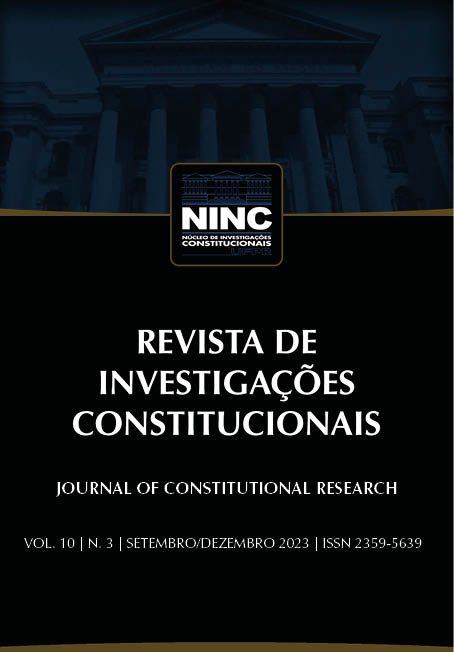Strengthening the Legitimacy of the Indonesian Constitutional Court Decision through Supermajority Requirement: Lesson from the South Korean Experience
DOI:
https://doi.org/10.5380/rinc.v10i3.89341Palavras-chave:
legitimacy, judicial review, Indonesian constitutional court, supermajority requirement, constitutional court of Korea.Resumo
Criticism toward the legitimacy of the constitutional court decisions in judicial review cases remains to be a common problem for many courts around the world, including the Indonesian Constitutional Court (popularly known as 'MK'). Thus, the Indonesian Constitutional Court was established with its structure designed to minimize the legitimacy problems in its decisions. Although efforts to minimize the problem of legitimacy have been made, the criticism toward Indonesian Constitutional Court’s legitimacy remains throughout its development, especially when the institution decides against public opinion. Over the years, the issue of legitimacy became even more complicated; the existing political institutions had expressed their intent to intervene in the Indonesian Constitutional Court through their power to appoint its judges. As such, there is a strong likelihood that the public will not consider the Court Decisions as independent, which in turn may further hamper its legitimacy. To resolve this issue, this paper shall discuss the ’supermajority’ mechanism, in which a supermajority vote amongst the judges is required in order for a law to be declared unconstitutional. We use Constitutional Court of Korea’s experience in implementing this mechanism as an example to prove that the adoption of the supermajority requirement has the potential to succeed in strengthening the legitimacy of the decisions of the constitutional courts as well as making it more difficult for the political institutions to capture the court.
Referências
BICKEL, Alexander M. The Least Dangerous Branch: The Supreme Court at the Bar of Politics. New York: Yale University Press, 1962.
BUTT, Simon. Why do Indonesian Judges Dissent?. Australian Journal of Asian Law, Melbourne, Vol. 23, n. 1, p. 1-19, nov. 2022.
BUTT, Simon. The Function of Judicial Dissent in Indonesia’s Constitutional Court. Constitutional Review, Jakarta, Vol. 4, n. 1, p. 1-26, may. 2018.
BUTT, Simon. Indonesia’s Constitutional Court: Conservative Activist or Strategic Operator. In: DRESSEL, Bjorn (Eds.). The Judicialization of Politics in Asia. New York: Routledge, 2012.
CAVIEDES, Cristóbal. A core case of supermajority rules in constitutional adjudication. International Journal of Constitutional Law, New York, p. 1-45, Forthcoming 2022. Available at https://papers.ssrn.com/sol3/papers.cfm?abstract_id=3919335.
EDITOR, ‘Legislative Overreach’. Jakarta Post, 2022. Available at https://www.thejakartapost.com/opinion/2022/10/09/legislative-overreach.html.
GINSBURG, Tom. Constitutional Courts in New Democracies: Understanding Variation in East Asia. Global Jurist, Turin, Vol. 2, n. 1, p. 1-24, jul. 2002.
GINSBURG, Tom. Confucian Constitutionalism? The Emergence of Constitutional Review in Korea and Taiwan. Law and Social Inquiries, Cambridge, Vol. 27, n. 4, p. 763-799, dec. 2002.
HENDRIANTO, Stefanus. Law and Politics of Constitutional Courts: Indonesia and the Search of Judicial Heroes. New York: Routledge, 2018.
HONG, Joon Seok. Signaling the Turn: The Supermajority Requirement and Judicial Power on the Constitutional Court of Korea. American Journal of Comparative Law, Oxford, Vol. 67, n.1, p. 177-217, 2019.
HOROWITZ, Donald L. Constitutional Change and Democracy in Indonesia. Cambridge: Cambridge University Press, 2013.
KELEMEN, Katalin. Dissenting Opinions in Constitutional Courts. German Law Journal, Washington, Vol. 14, n. 8, p. 1345-1371, aug. 2013.
KUO, Ming-Sung; CHEN, Hui-Wen. Constitutional Review 3.0 in Taiwan: A Very Short Introduction of Taiwan’s New Constitutional Court Procedure Act. Int’l J. Const. L. Blog, 07 jan. 2022. Available at http://www.iconnectblog.com/2022/01/constitutional-review-3-0-in-taiwan-a-very-short-introduction-of-taiwans-new-constitutional-court-procedure-act/.
LEE, Seokmin. Adultery and the Constitution: A Review on the Recent Decision of the Korean Constitutional Court on ‘Criminal Adultery’. Journal of Korean Law, Seoul, Vol. 15, n. 2, p. 325-353. jun. 2016.
PARK, Jonghyun. The Judicialization of Politics in Korea. Asian Pacific Law & Policy Journal, Honolulu, Vol. 10, n. 1, p. 62-113, jan. 2008.
POMPE, Sebastiaan. Indonesian Supreme Court: A Study of Institutional Collapse. Ithaca: Cornell Southeast Asia Program, 2005.
PRATIWI. Priska Sari. MUI: Zina dan LGBT harusnya dipidana. CNN Indonesia. 2017. Available at https://www.cnnindonesia.com/nasional/20171215154930-20-262683/mui-zina-dan-lgbt-harusnya-dipidana.
RAHADIAN, Lalu. MUI Pertanyakan Putusan MK yang Tolak Kriminalisasi LGBT. Tirto, 2017. Available at https://tirto.id/mui-pertanyakan-putusan-mk-yang-tolak-kriminalisasi-lgbt-cBMh.
ROZNAI, Yaniv. Introduction: Constitutional Courts in a 100-Years Perspective and a Proposal for a Hybrid Model of Judicial Review. Vienna Journal on International Constitutional Law, Vienna, Vol. 14, n. 4, p. 355-377, 2020.
ROUX, Theunis. Judicial Activism. In Elgar Encyclopedia on Comparative Law. New York: Edward Elgar, Forthcoming. Available at https://papers.ssrn.com/sol3/papers.cfm?abstract_id=3923921.
SATRIO, Abdurrachman. LGBT Rights and the Constitutional Court: Protecting Rights without Recognizing them. In CROUCH, Melissa (Eds.). Constitutional Democracy in Indonesia. Oxford: Oxford University Press, forthcoming 2023.
SITARAMAN, Ganesh; EPPS, Daniel. How to Save the Supreme Court. Yale Law Journal, New Haven, Vol. 129, n. 1, p. 148-206, 2019.
YUN, Jeong-In Yun. Constitutional Review Complaint as an Evolution of the Kelsenian Model. Vienna Journal on International Constitutional Law, Vienna, Vol. 14, n. 4, p. 423-446, 2020.
Downloads
Publicado
Como Citar
Edição
Seção
Licença
Autores que publicam nesta revista concordam com os seguintes termos:- Autores mantém os direitos autorais e concedem à revista o direito de primeira publicação, com o trabalho simultaneamente licenciado sob a Creative Commons - Atribuição 4.0 Internacional que permite o compartilhamento do trabalho com reconhecimento da autoria e publicação inicial nesta revista.
- Autores têm autorização para assumir contratos adicionais separadamente, para distribuição não-exclusiva da versão do trabalho publicada nesta revista (ex.: publicar em repositório institucional ou como capítulo de livro), com reconhecimento de autoria e publicação inicial nesta revista.
- Autores têm permissão e são estimulados a publicar e distribuir seu trabalho online (ex.: em repositórios institucionais ou na sua página pessoal) a qualquer ponto antes ou durante o processo editorial, já que isso pode gerar alterações produtivas, bem como aumentar o impacto e a citação do trabalho publicado (Veja O Efeito do Acesso Livre).
























